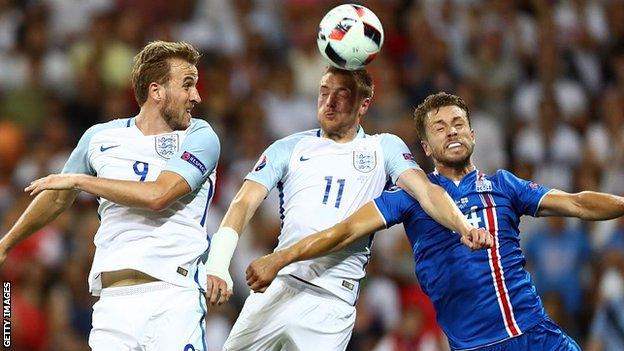Uefa Euro 2020: Everything you need to know about the summer's tournament
- Published
- comments

England, Scotland and Wales will all play at Euro 2020
The Uefa Euro 2020 line-up is complete.
Some eight months later than expected - because of the coronavirus pandemic - the final four places for next summer's tournament were decided.
Scotland joined England and Wales in qualifying, thanks to a dramatic penalty shootout win against Serbia in their qualifying play-off final.
The tournament, originally scheduled to take place from 12 June to 12 July last summer, will now run from 11 June to 11 July 2021.
It will consist of 24 teams and 51 matches in 11 host cities across Europe, although it remains unknown how many fans will be allowed at the tournament, because of the ongoing global heath crisis.
Regardless, the tournament will be live across the BBC - on television, radio and online.
Who is in which group?
Group A: Italy, Switzerland, Turkey, Wales
Group B: Belgium, Russia, Denmark, Finland
Group C: Ukraine, Netherlands, Austria, North Macedonia
Group D: England, Croatia, Czech Republic, Scotland
Group E: Spain, Poland, Sweden, Slovakia
Group F: Germany, France, Portugal, Hungary
Where and when will Scotland play?

Scotland will play in a major men's tournament for the first time since 1998
Steve Clarke's Scotland have ended a 23-year wait for men's major tournament football after beating Serbia in their play-off final in Belgrade.
That wait comes to an end against the Czech Republic in Glasgow on 14 June, with a trip to face England at Wembley following on 18 June and a final group game at Hampden Park against Croatia four days later.
Monday 14 June: Scotland v Czech Republic (Hampden Park)
Friday 18 June: England v Scotland (Wembley)
Tuesday 22 June: Croatia v Scotland (Hampden Park)
If they win their group, their last-16 tie would be in London against the runners-up in a hugely competitive-looking Group F - made up of Germany, France, Portugal and Hungary - with a potential quarter-final to follow in Rome.
Should they finish second, it would be a trip to Copenhagen against the runners-up from Group E, which features Spain, before a quarter-final in St Petersburg. There are other possibilities if they are one of the best third-place finishers.
Where and when will England play?

England were knocked out of Euro 2016 by Iceland in the round of 16
England will benefit from hosting all three of their group games at Wembley.
Their tournament begins against Croatia in a repeat of the 2018 World Cup semi-final, which was won by Zlatko Dalic's side.
Sunday 13 June: England v Croatia (Wembley)
Friday 18 June: England v Scotland (Wembley)
Tuesday 22 June: Czech Republic v England (Wembley)
England's scenario is the same as Scotland's above - winning the group would bring a last-16 tie in London against the runners-up in Group F - one of Germany, France, Portugal and Hungary - with a potential quarter-final in Rome.
Finishing second would take England to Copenhagen against the runners-up from Group E - one of Spain, Poland, Sweden and Slovakia - before a quarter-final in St Petersburg. There are other possibilities if they are one of the best third-place finishers.
Where and when will Wales play?

Wales' players celebrated their superb run to the semi-finals of Euro 2016 with an open top bus parade
Wales, semi-finalists in 2016, are in Group A alongside 1968 winners Italy, who won all 10 of their qualification matches and conceded just four goals.
They are joined by Switzerland, winners of their qualification group, and a Turkey side that earned a win and a draw against world champions France.
Italy will play their three group games at Rome's Stadio Olimpico, with the other matches taking place at Baku's Olympic Stadium, in Azerbaijan.
Saturday 12 June: Wales v Switzerland (Baku)
Wednesday 16 June: Turkey v Wales (Baku)
Sunday 20 June: Italy v Wales (Rome)
The most difficult group ever?
World champions France, European champions Portugal and the previous World Cup winners Germany are all together with play-off winners Hungary in Group F.
This is only the second major tournament where the world champions and the European champions will have met in the group stage - after Euro 1992, when the Netherlands beat Germany.
Germany, who won the 2014 World Cup, will host their three group games in Munich, with the other matches in Budapest.
"This is a group of death," said Germany boss Joachim Low, who will step down from his role after the tournament.
Host cities/stadiums
The 11 Euro 2020 host cities are: Amsterdam, Baku, Bucharest, Budapest, Copenhagen, Glasgow, Munich, London, Rome, Seville and St Petersburg.
Dublin and Bilbao were originally host cities but missed out on hosting games after being unable to guarantee spectator attendance.
Seville is a new Euro 2020 host city. The four matches initially scheduled to take place in Bilbao have been switched to the Estadio La Cartuja. The venue will host about 30% of the stadium capacity.
The three Group E matches initially scheduled for Dublin will now take place at St Petersburg Stadium in Russia.
The round of 16 match initially scheduled for Dublin has been moved to Wembley.
1. Glasgow (Hampden Park, capacity 51,000). Three group games, one last-16 game.
2. London (Wembley, 90,000). Final and both semi-finals, two last-16 games, three group games.
3. Seville (Estadio de La Cartuja, 60,000). Three group games, one last-16 game.
4. Amsterdam (Johan Cruyff Arena, 54,000). Three group games, one last-16 game.
5. Copenhagen (Parken Stadium, 38,000). Three group games, one last-16 game.
6. Munich (Football Arena Munich, 70,000). Three group games, one quarter-final.
7. Rome (Stadio Olimpico, 68,000). Three group games, one quarter-final.
8. Budapest (Puskas Arena, 68,000). Three group games, one last-16 game.
9. St Petersburg (Krestovsky Stadium, 61,000). Six group games, one quarter-final.
10. Bucharest (Arena Nationala, 54,000). Three group games, one last-16 game.
11. Baku (Olympic Stadium, 69,000). Three group games, one quarter-final.
Countries allowed to select 26-player squads
Teams will be allowed to select a 26-player squad instead of the usual 23 at this summer's tournament.
The change has been implemented to lessen the load on players after a club season compressed because of the coronavirus pandemic.
It will also help managers adapt if outbreaks occur during the tournament.
A rule allowing each team to make up to five substitutes per game had already been confirmed.
However, 23 players will remain the maximum number permitted on team sheets for matches.
Will crowds be allowed?
All the venues hosting the tournament will allow fans to attend the matches, say Uefa., external
St Petersburg and Baku have confirmed capacities of 50%. Budapest aims to host 100% of the stadium capacity, but with strict stadium entry requirements for spectators.
Amsterdam, Bucharest, Copenhagen, Glasgow, Rome and Seville will be hosting 25%-33% of the stadium capacity.
Wembley has confirmed a minimum capacity of 25% for the first three group matches and round of 16 match.
Munich aims to host a minimum of 14,500 spectators, approximately 22% of the stadium capacity.
The Scottish government has given approval for 12,000 supporters - close to 25% of Hampden Park's capacity - to attend Euro 2020 matches.

New His Dark Materials: Series 2 is streaming now
Ladhood Box Set: A hilarious look at trying to grow up
